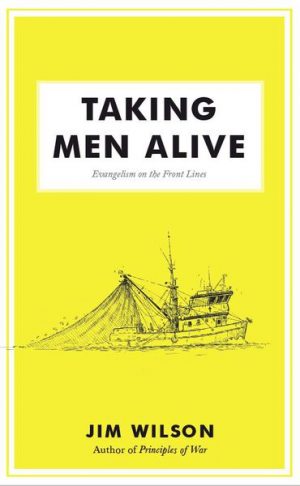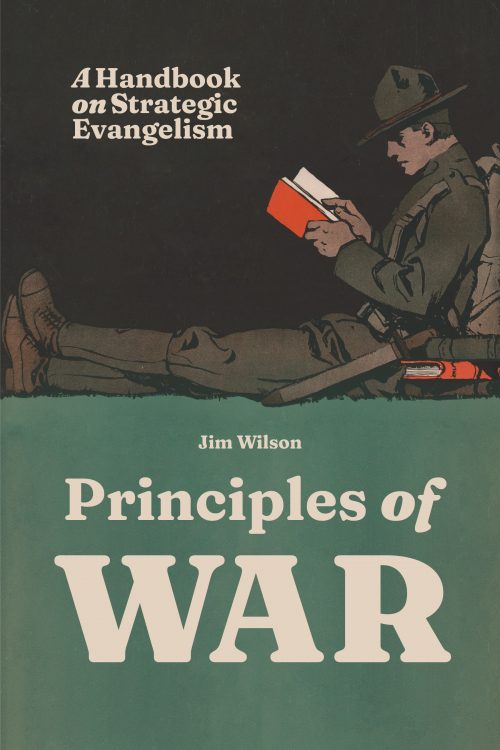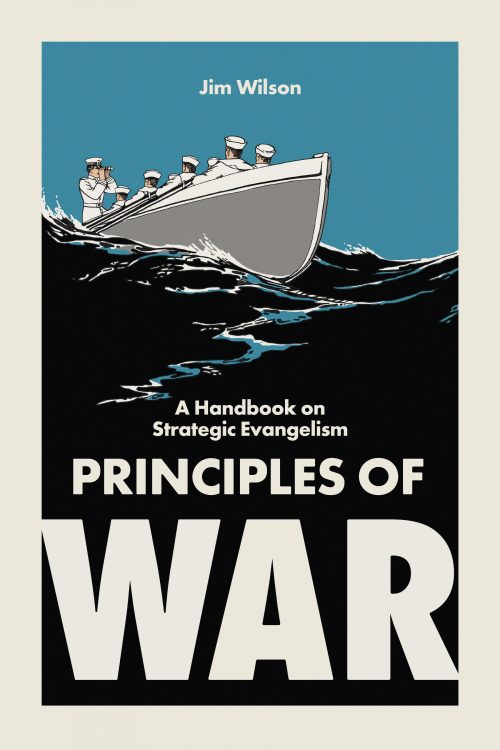
-
 Evangelism on the Front Lines Coming from decades of faithful witnessing as a pastor, a U.S. Navy officer, and a door-to-door evangelist, Taking Men Alive shares Jim Wilson's extensive wisdom on evangelism. Jim's insights have been gleaned from a huge variety of personal interactions and straightforward (yet surprising) exegesis of biblical accounts of evangelism. Entertaining and intensely practical, Taking Men Alive is an inspiring evangelistic meditation and powerful handbook for determining what spiritual state your neighbor is in and how you should approach taking his heart for the Lord Jesus Christ.
Evangelism on the Front Lines Coming from decades of faithful witnessing as a pastor, a U.S. Navy officer, and a door-to-door evangelist, Taking Men Alive shares Jim Wilson's extensive wisdom on evangelism. Jim's insights have been gleaned from a huge variety of personal interactions and straightforward (yet surprising) exegesis of biblical accounts of evangelism. Entertaining and intensely practical, Taking Men Alive is an inspiring evangelistic meditation and powerful handbook for determining what spiritual state your neighbor is in and how you should approach taking his heart for the Lord Jesus Christ.
-
 We love our kids, but do we love like God loves....without conditions, reservations, or reluctance? In this excerpt from his popular book How to be Free from Bitterness, Jim Wilson identifies the troublesome consequences of insufficient parental love and points readers to the glorious fruit of superabundant kindness, and patience and helps parents apply the eternal truths of Scripture to grow peace and joy in their homes.
We love our kids, but do we love like God loves....without conditions, reservations, or reluctance? In this excerpt from his popular book How to be Free from Bitterness, Jim Wilson identifies the troublesome consequences of insufficient parental love and points readers to the glorious fruit of superabundant kindness, and patience and helps parents apply the eternal truths of Scripture to grow peace and joy in their homes.
-
 “Oh, the depth of the riches and wisdom and knowledge of God!” (Rom. 11:33). Our heavenly Father has given us unfathomable blessings, but we often fail to live as if they are truly ours. In thankfulness and Confession, Brad Scheelke encourages readers to meditate on and rejoice in the glorious riches of our inheritance in Christ. As we regularly give thanks for what God has given us, our thoughts and actions will begin to change . . . often in surprising ways. Gratitude also changes how we deal with sin. When we confess our sin, bringing it into the light of Christ’s riches, we now see not only the darkness of our own evil, but also the beauty of God’s holiness and grace. When we learn to practice thankfulness and confession in this way, our hearts will overflow in joy, in love for one another, and in glory to God.
“Oh, the depth of the riches and wisdom and knowledge of God!” (Rom. 11:33). Our heavenly Father has given us unfathomable blessings, but we often fail to live as if they are truly ours. In thankfulness and Confession, Brad Scheelke encourages readers to meditate on and rejoice in the glorious riches of our inheritance in Christ. As we regularly give thanks for what God has given us, our thoughts and actions will begin to change . . . often in surprising ways. Gratitude also changes how we deal with sin. When we confess our sin, bringing it into the light of Christ’s riches, we now see not only the darkness of our own evil, but also the beauty of God’s holiness and grace. When we learn to practice thankfulness and confession in this way, our hearts will overflow in joy, in love for one another, and in glory to God. -
 Jesus’ death paid for our sins - the guilt, the death, and the punishment. Jesus does not repay the man who got ripped off when we stole from him. According to the Bible, the person who comes to the Lord in repentance is to pay the one he stole from the value of the stolen goods plus one fifth of the value. But what if it is a candy bar you took twenty years ago? The amount stolen and the time since the theft do not make it yours. There are many Christians who are living subnormal Christian lives because they are too proud or too afraid to make restitution. They are like people with low-grade fevers; they are not sick enough to be in bed, but too sick to do anything worthwhile. Even if no one knows about the thefts, these Christians are poor witnesses for Jesus Christ. They may have confessed and repented in words, but if they do not make restitution, it is not true repentance, and they are not forgiven.
Jesus’ death paid for our sins - the guilt, the death, and the punishment. Jesus does not repay the man who got ripped off when we stole from him. According to the Bible, the person who comes to the Lord in repentance is to pay the one he stole from the value of the stolen goods plus one fifth of the value. But what if it is a candy bar you took twenty years ago? The amount stolen and the time since the theft do not make it yours. There are many Christians who are living subnormal Christian lives because they are too proud or too afraid to make restitution. They are like people with low-grade fevers; they are not sick enough to be in bed, but too sick to do anything worthwhile. Even if no one knows about the thefts, these Christians are poor witnesses for Jesus Christ. They may have confessed and repented in words, but if they do not make restitution, it is not true repentance, and they are not forgiven. -

 In the study of warfare, great men have concluded that there are some overriding principles which, if followed, will always tend toward success in battle, and if neglected or ignored, will tend toward defeat or even destruction. These principles have been entitled the "principles of war." But not all warfare is waged on a battlefield: every Christian is called to be a soldier. Our fight is against Satan, our objective is the acknowledgment and fulfillment of God's commands, and our ammunition is the power of the Holy Spirit. In Principles of War, Jim Wilson outlines the time-tried, fundamental principles of war and explains how we can employ them in our daily spiritual battles as we fight a war which our commander in chief has already won for us.
In the study of warfare, great men have concluded that there are some overriding principles which, if followed, will always tend toward success in battle, and if neglected or ignored, will tend toward defeat or even destruction. These principles have been entitled the "principles of war." But not all warfare is waged on a battlefield: every Christian is called to be a soldier. Our fight is against Satan, our objective is the acknowledgment and fulfillment of God's commands, and our ammunition is the power of the Holy Spirit. In Principles of War, Jim Wilson outlines the time-tried, fundamental principles of war and explains how we can employ them in our daily spiritual battles as we fight a war which our commander in chief has already won for us. -
 Vincit qui se vincit“He conquers who conquers himself.”Is it ok to be in the military and be moral? The answer is yes. In the early 1950s, my ship left San Diego for the Western Pacific. We had eighteen “boots” aboard. The captain decided that these young men needed to be protected, and should be informed of the facts of life. It was a three-pronged effort. The exec talked to the men in a fatherly sort of way about their mothers, their sisters, their hometown girlfriends, and their wives. This nostalgia was to protect them from waywardness. An “assigned” chaplain talked with them about absolute morality and sin. And finally, the medical officer and the corpsman taught them about condoms and “past event cleansing.” ... The training had left out the effects of peer pressure... This essay was first written for the U.S. Naval Institute Prize Essay Contest. Because of the gross moral lapses in the U.S. military in the last few decades, I thought I should prepare it for distribution to our future leaders. It is dedicated to the future military leadership of the United States. - James I. Wilson
Vincit qui se vincit“He conquers who conquers himself.”Is it ok to be in the military and be moral? The answer is yes. In the early 1950s, my ship left San Diego for the Western Pacific. We had eighteen “boots” aboard. The captain decided that these young men needed to be protected, and should be informed of the facts of life. It was a three-pronged effort. The exec talked to the men in a fatherly sort of way about their mothers, their sisters, their hometown girlfriends, and their wives. This nostalgia was to protect them from waywardness. An “assigned” chaplain talked with them about absolute morality and sin. And finally, the medical officer and the corpsman taught them about condoms and “past event cleansing.” ... The training had left out the effects of peer pressure... This essay was first written for the U.S. Naval Institute Prize Essay Contest. Because of the gross moral lapses in the U.S. military in the last few decades, I thought I should prepare it for distribution to our future leaders. It is dedicated to the future military leadership of the United States. - James I. Wilson -

Rejoice in the Lord always: again I will say, rejoice. (Phil. 4:4 NKJV)
Restore to me the joy of your salvation and grant me a willing spirit to sustain me. (Psalm 51:12)
Have you ever felt like you are just wasting away, like your strength is sapped? The normal Christian life is a life of joy. Yet many (if not most) Christians are not consistently joyful. What is it that keeps us from obeying the command to rejoice always? Often, it is unconfessed and unrepented sin that hinders us from living a life of joy.
In this short booklet, Jim Wilson shares the story of his early Christian walk and his journey towards understanding the connection between repentance and rejoicing in the Lord. With Scripture, graphs, and clear explanations, he helps us see how failure to confess sins quickly steals our joy and how keeping short accounts—both with God and with others—sets us free to rejoice in the Lord no matter the circumstances.
-
 In Christianity and all religions that claim to be Christian, there is a promise of salvation. The promise may be conditional, or it may be positive, but it will be based on either doctrine or works. This booklet gives nine biblical, experiential evidences of salvation. When a person compares his experiences with those described in the Bible, he may come to one of several conclusions:
In Christianity and all religions that claim to be Christian, there is a promise of salvation. The promise may be conditional, or it may be positive, but it will be based on either doctrine or works. This booklet gives nine biblical, experiential evidences of salvation. When a person compares his experiences with those described in the Bible, he may come to one of several conclusions:- He thought he was not saved, but he finds out that he is.
- He thought he was saved, but finds out he isn't.
- He thought he was not saved, and that is confirmed.
- He thought he was saved, and now he knows that he is.


